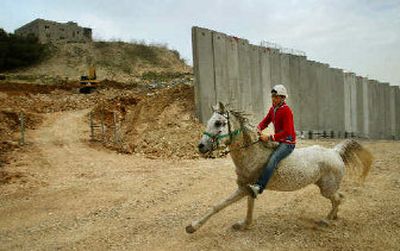West Bank Palestinians have hope, but Wall likely staying

AL AZARYA, West Bank – Ahmad Abu Zaid and his children and their children watched it on television for three straight days, sometimes until 2 a.m., and they smiled because Israelis were pushing Israelis out of Palestinian land.
One day, they said, maybe it’ll happen here. Maybe we’ll be free of the daily intrusions and frustrations and humiliations of living under occupation. Maybe one day we Palestinians of the West Bank will be free of not only the Israelis but also The Wall.
“The children were laughing,” said Wafa Abu Zaid, Ahmad’s daughter. This would be a lot of laughter, because she’s the mother of five of his grandchildren. “They said, `When will it be my turn?”’
The answer is: Not for a very long time, if ever. One objective of Israel’s withdrawal from the Gaza Strip is to set the stage for a tighter grip on the much larger West Bank.
That would include Al Azarya, a town that sits on the West Bank just on the other side of the mountain from Jerusalem, almost as a suburb. It’s separated, however, by generations of hostility, several magnitudes of poverty and now The Wall.
In Israel, The Wall is known as the security fence and, still under construction, it runs for 177 miles and counting.
Sometimes a tall wire fence, sometimes a 30-foot-high concrete monolith that blocks the view and blots out the sky, it protects Israelis from Palestinian areas that produced the waves of suicide bombers.
In the old days around here, they built walls around cities to repel invaders. Now they’ve built a wall around much of a country, a wall that has proved effective but is also perfect in its symbolism, a wall that says Israelis and Palestinians may never be able to end the circle of violence and live together in peace.
A wall that sits just a few yards from Wafa Abu Zaid’s home in Al Azarya.
“In the morning, in the night, always there,” she said. “It’s a very bad feeling because you see how hot it is now? The wind, the air, everything is stopped now.”
As Israelis and Palestinians watched nonstop coverage of Israel’s forced removal of Jewish settlers from Gaza, she welcomed several guests Wednesday into her home near the top of a steep hill.
They shook hands with her shy and polite children, sat on nicely upholstered chairs, sipped sweet tea with mint, ate chocolate wafers. Framed family pictures and soothing excerpts from the Quran hung on the wall.
The wall of the sitting room, that is. Not The Wall.
Israelis say the security fence is an unfortunate necessity, “a passive, temporary and effective measure against suicide terrorists,” according to a government statement.
Palestinians say it doesn’t look very temporary to them. It’s a form of collective punishment, they say, and it often intrudes on Palestinian land that Israel had never claimed before.
“This is the only point,” Ahmad Abu Zaid said. “I don’t like The Wall because it separates the two countries. All over the world, there are borders of the countries and there are no walls.
“As Palestinians, we look for peace with the Israelis. And I think this wall will not make security and peace for both of us. If you want to be my good neighbor, we need to take away the fence between us.”
Also, it interferes with normal life: visiting friends and relatives, attending school and religious services, conducting commerce.
The owner of a food market, Ahmad has seen his business nearly crash since The Wall arrived in his neighborhood last year.
“Before The Wall, many come from Jerusalem and around there to buy meat and fish and chickens because it is cheaper here,” he said.
“Before I sell maybe 1,000, 1,500 shekels a day. Now you come to visit my store, you see it is empty, and in 20 days I didn’t sell – believe me – 2,000 shekels all together. I’m thinking I will have to close.”
So he and his family hope The Wall somehow will disappear from the West Bank, physically and symbolically.
“Of course,” he said. “You don’t like to be free? Anyone likes to be free, if you are in a cage.”
Does he think this will happen in his lifetime? He’s 58.
“In my life, I think no. It needs time. Slowly, slowly.”
A few hours later, an Israeli settler grabbed a gun from a security guard in the West Bank and used it to kill four Palestinians and wound one other.